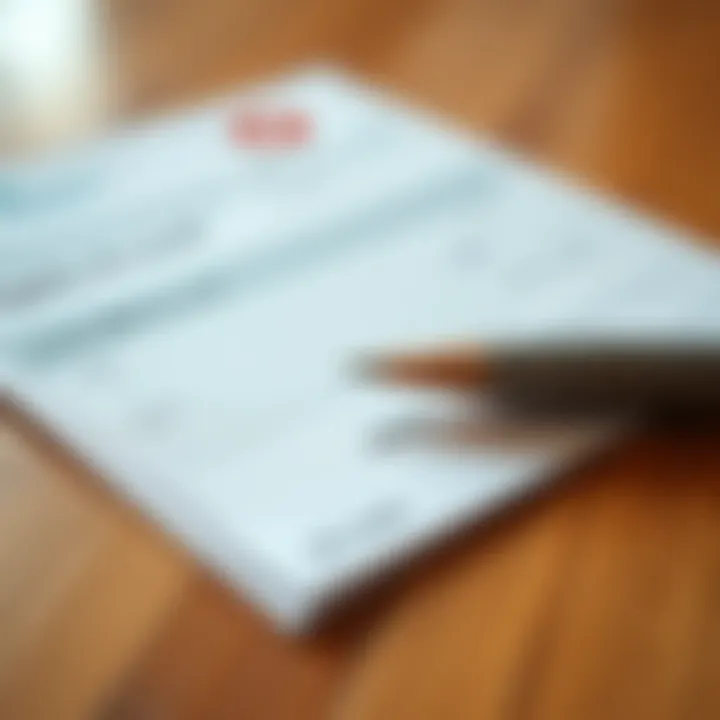Guide to Opening a Bank Account with a Check


Intro
Opening a bank account might seem like a mundane task, but it can actually be a pivotal step in managing your financial future. The process can involve various methods, one of which is the use of a check as an initial deposit. This method is not just a practical option but also a testament to the enduring role of checks in our increasingly digital banking world.
In this guide, we'll delve into the ins and outs of opening a bank account using a check. It’s essential to understand the eligibility requirements and the documents you’ll need. We’ll also explore the types of accounts you can open with a check, alongside practical tips that can streamline the application process. By the end of this article, you’ll have a clear roadmap laid out before you that empowers you to make informed choices. This isn't just about plopping down a check at the bank; it’s about navigating your way through the modern financial landscape with confidence.
Let’s get rolling and demystify the overall process.
Preamble
Opening a bank account is a critical step that can shape an individual’s financial journey. Whether you are a recent graduate stepping into the world of finance for the first time or someone who has navigated these waters before, understanding this process is essential. It's not just about having a safe place to stash your money; a bank account can serve as a gateway to managing finances, securing loans, and building a solid credit history.
Using a check to open a bank account does come with its own set of rules and opportunities. For many, checks represent a reliable method of making initial deposits, and even though online transfers are on the rise, checks aren’t disappearing anytime soon. The familiarity of the process provides comfort, especially for those accustomed to traditional banking practices. Many find that using a check, rather than cash or electronic means, grants them peace of mind in terms of tracking funds and ensuring security during the deposit process.
Several factors necessitate understanding how checks can play a role in account opening. Is your check personal, or a cashier's check? What are the implications of each type? Moreover, various banks have different policies around opening accounts with checks, and these nuances can affect your options drastically.
Aiming to clarify these complexities, this article lays out a comprehensive guide covering several areas essential to this process. Users will learn about the different types of accounts available, eligibility requirements, relevant documentation, and the different approaches one can take—both online and in person.
This guide seeks to empower individuals by providing clear, actionable insights, allowing them to navigate the banking landscape with confidence.
As we explore these aspects, consider what benefits opening a bank account with a check might bring to your financial management strategy. With so many shifting sands in today’s banking environment, having the proper knowledge can make all the difference.
Understanding Bank Account Basics
Opening a bank account can feel like learning a new language, especially when you’re unfamiliar with the terminology and options available. That’s why understanding the basics of bank accounts is crucial. It serves as a foundation to help you make informed financial decisions, such as what type of account suits your needs best, and how you can leverage these accounts to manage your finances effectively.
At its core, a bank account is less about the physical bank and more about how you manage your money. It allows you to store funds safely, but also provides access to numerous financial services. This section will delve into different types of accounts, their key features, and why knowing these aspects can be beneficial for anyone looking to open an account, particularly when using a check as a form of initial deposit.
Types of Bank Accounts
Understanding the various types of bank accounts can make the selection process less daunting. Here’s a closer look at the three primary types:
Checking Accounts
A checking account is a tool designed primarily for daily financial transactions. It plays a crucial role when you're opening an account with a check, as it allows for frequent deposits and withdrawals. One of the key characteristics of checking accounts is their liquidity, which means you can access your funds easily without any withdrawal restrictions. The unique feature of checking accounts lies in their ability to offer debit card access, online payments, and transfers, making them a popular choice for day-to-day expenses.
However, one should be aware of potential drawbacks such as monthly maintenance fees or overdraft charges. Thus, while checking accounts provide convenient access to funds, it’s essential to manage them wisely to avoid unnecessary costs.
Savings Accounts
Savings accounts offer a different purpose than checking accounts, focusing on building wealth over time through interest accrual. The key characteristic of a savings account is its higher interest rate compared to checking accounts, which incentivizes saving money over just holding it. This unique feature also usually includes limited transaction capabilities, which might be seen as a disadvantage if you're someone who frequently needs to access cash.
Nevertheless, this limitation encourages disciplined saving habits. If you’re considering opening a bank account with a check, a savings account can serve as a buffer to help manage future expenses.
Certificates of Deposit
Certificates of Deposit (CDs) are a step up in terms of saving strategies. They require you to deposit a fixed amount of money for a specified duration in exchange for higher interest rates. The key characteristic of CDs is their ability to offer guaranteed returns on your deposit, which is beneficial if you are planning to set money aside for the long haul.
While the unique feature of a CD is its fixed term—ranging from months to years—early withdrawal penalties can be a significant disadvantage. For a customer using a check to open an account, CDs may not be the best immediate solution but are certainly an option worth considering for future growth.
Key Features of Bank Accounts
When opening a bank account, understanding key features can simplify your banking experience even further. Here are the primary aspects to consider:
Interest Rates
Interest rates are crucial when evaluating bank accounts, particularly for those aiming to earn some passive income from their savings. The key characteristic is how much your bank pays you on your deposits. This is particularly beneficial for savings accounts and certificates of deposit, as higher interest rates can significantly increase savings over time. The unique feature of variable rates means they might change based on the economic climate. While this can be an advantage if rates increase, it can also disadvantage if they decrease, which makes this aspect worth monitoring.
Fees and Charges
Fees and charges can be the sneaky culprits that eat away at your savings. It's important to understand what each bank may charge for maintenance, transactions, or overdrafts. The key characteristic here is transparency; banks should clearly list any fees associated with their accounts. This is particularly beneficial as it helps you budget effectively while avoiding surprises. The unique feature of some accounts is that they come with no monthly maintenance fees if certain conditions are met—such as maintaining a minimum balance. Yet, it’s critical to read the fine print to avoid hidden costs that could dampen your banking experience.
Minimum Balance Requirements
Finally, minimum balance requirements can dictate how you manage your finances. Many banks require you to maintain a certain balance to keep your account open or to avoid fees. The key characteristic here is the flexibility some banks offer; while some might require significant balances, others have lower thresholds or none at all. This flexibility can be beneficial when using a check for initial deposits, allowing you to open an account with some peace of mind. However, it’s crucial to be careful, as dropping below the minimum can result in fees, negating any benefits.
Understanding the foundational elements of banking allows you to navigate the financial landscape with confidence, ensuring you don’t leave money on the table.
Using a Check for Account Opening


When it comes to opening a bank account, utilizing a check can be a practical option. Not only does it streamline the initial deposit process, but it also offers potential benefits and some unique considerations. In this section, we will delve into key elements such as eligibility requirements, advantages of using a check, and how it fits into the overall banking experience.
Eligibility to Use a Check
Account Holder Requirements
The first step to opening a bank account with a check involves understanding the account holder requirements. Generally, banks require that the person opening the account is at least 18 years old and can legally enter into a contract. This qualification remains foundational for the process. If a minor wants to open a bank account, they typically need a guardian or parent involved.
What makes this aspect particularly significant is its focus on responsibility. Banks want to ensure that the account holder can manage their finances effectively, thus reducing the risk of defaults. Moreover, in most cases, providing a valid Social Security number is a must. This requirement streamlines the identification process and establishes a clear link between the individual and the financial institution.
One standout feature of these requirements is that they help to create a trusted banking environment. In a landscape filled with fraud risks, knowing your customer (KYC) regulations play a crucial role. They ensure that you, as the account holder, are recognized for who you genuinely are, thus streamlining your banking experience and reinforcing financial safety.
Types of Acceptable Checks
When it comes to the types of acceptable checks, it’s important to be informed about what the bank will allow for your initial deposit. Checks can generally be divided into two categories: personal checks and cashier's checks. Personal checks, while more common, can take longer to clear and may be subject to holds. Cashier's checks, on the other hand, are issued directly by the bank and can prompt immediate access to funds, making them a popular choice for individuals looking to open an account.
The key feature of acceptable checks is their varied nature. Different banks may have different policies regarding what checks they accept as an initial deposit. This differences can influence your decision on which bank to choose.
Unique to the nature of checks is their potential for security. Using a cashier's check minimizes the need to carry cash and offers a safer method of transferring funds. However, one downside is that fees may be associated with obtaining these checks, which should be taken into account when evaluating your banking options.
Advantages of Opening with a Check
Immediate Fund Availability
One significant advantage of immediate fund availability occurs when your check is cleared, allowing instant access to your money. This process enhances your overall banking experience, especially if you are looking to make quick transactions or pay bills shortly after setting up your account. The quick turnaround associated with cashier’s checks can be especially advantageous for individuals who need to deposit large sums without waiting for standard checks to clear.
The key characteristic of this benefit is its efficiency. Immediate access to funds helps you manage your financial obligations smoothly and helps avoid potential late fees on bills. Though it’s beneficial, you must still be vigilant about ensuring that the check won’t bounce.
Tracking of Spending
Another advantage of using checks is their ability to help individuals with tracking of spending. When you deposit a check, not only does it land in your account's activity log, but it also provides a paper trail that can be invaluable for budgeting and financial management.
The clear documentation provided by checks can simplify the task of tracking expenditures, allowing you to keep tabs on where your money goes. It offers a tangible reference point, especially if you're trying to improve your overall financial health and identify spending patterns.
However, a unique downside to this practice is that reliance on checks, particularly personal checks, might impede spontaneous spending if you’re waiting for them to clear. It may cause a temporary block in your natural spending flow, primarily if you are used to quick transactions through debit or credit cards.
"Checks provide a clear view of your spending habits and are often underestimated in the digital age."
Overall, using checks to open a bank account is not only viable but also comes with distinct advantages, practicality, and considerations that necessitate a keen understanding before proceeding. It is imperative that potential account holders weigh these foundational elements to ensure the smooth management of their finances as they embark on their banking journey.
Documentation Needed for Account Opening
When it comes to opening a bank account using a check, providing the right documentation is crucial. It not only streamlines the process but also ensures that both the bank and the individual are protected against fraud. Without the appropriate documents, a banking institution may delay or even deny an application. Hence, understanding what’s needed can save time and avoid unnecessary headaches.
Personal Identification
Social Security Number
The Social Security Number (SSN) serves as a unique identifier for each individual in the United States. It's often required by banks to verify identity and report to tax authorities. One major reason why it’s so essential is because it links individuals to their financial histories and interests directly. Most banks see it as a standard part of the identification process.
Key Characteristic: The SSN is a lifetime identifier; it remains with you throughout your life.
Benefits: Having an SSN simplifies various banking tasks, especially when you need to apply for loans or credit cards. It provides a clear link between the individual and their financial activities, making it a popular choice for banks when assessing trustworthiness.
Unique Feature: Importantly, your SSN allows you to build credit over time, which can open doors to better interest rates and financial products down the line. However, on the flip side, losing this number can lead to significant risks, such as identity theft. Despite its risks, the necessity of the SSN cannot be understated during the account opening process.
Government-issued
A government-issued ID, such as a driver’s license or passport, acts as a solid form of verification when you open a bank account. This id is not just a piece of plastic; it showcases your identity and serves the purpose of validating your address along with other personal details. It’s your ticket to proving you are who you say you are.
Key Characteristic: Typically, this ID should have a photo alongside your name and address, ensuring that whoever is viewing it can confirm your identity effectively.
Benefits: The beauty of presenting a government-issued ID is its universal acceptance. Most banks will readily recognize these forms because they undergo stringent verification checks at the issuance stage. They hinge their trust in you partly because of what these IDs represent.
Unique Feature: One downside, however, is that if your ID is nearing expiration or lost, it may lead to complications during the account setup. This can delay processes and lead to frustration, as banks often require not just an ID, but an active one.
Proof of Address
Utility Bill
Utility bills are commonly used as proof of address for opening bank accounts, and for a good reason. They provide evidence of where you currently reside. These documents are straightforward and usually come on a monthly basis, making them readily available to most people.


Key Characteristic: A utility bill typically includes not just your name but also your home address, and a date indicating the bill's issuance, which helps verify your current location.
Benefits: Using a utility bill can ease the process of account setup, as it is widely accepted by financial institutions. Its straightforward nature allows banks to verify an applicant's residence without hassle.
Unique Feature: While this is a strong form of proof, bear in mind that not all utilities may suffice for every bank – some might require specific services like water or electricity bills for full confirmation.
Lease Agreement
A lease agreement serves as another form of proof of address, especially for renters. This document is a formal contract between a tenant and a landlord and outlines the terms of living in a specific place. It’s an excellent piece of evidence that can establish both your residence and your commitment to living at that address.
Key Characteristic: The lease typically details your name, the property address, and the length of your stay.
Benefits: It’s beneficial for those who do not have utility bills in their name or who’ve just moved into a new place. A lease agreement showcases a formal acknowledgement by a landlord of your right to reside there.
Unique Feature: On the downside, lease agreements can sometimes require being current and recognizable to the bank, so outdated or unclear contracts may hinder the opening process.
Always remember, providing clear and current documentation is not just about fulfilling requirements. It's about ensuring that your banking experience is smooth from the onset.
The Application Process
Opening a bank account may seem like a simple task on the surface, but there are layers to the application process that can make it a bit more complicated, particularly when using a check as your initial deposit. Understanding each step is vital for ensuring that everything goes smoothly. Whether you opt for an in-person visit to a bank branch or choose to navigate the process online, knowing the ins and outs of how to apply is crucial for achieving your financial goals without unnecessary hiccups.
Benefits of a Structured Application Process:
- A well-defined process ensures you have all necessary documentation ready, preventing potential delays.
- Being informed can help you identify which type of account best suits your needs.
- Clear steps allow you to weigh the advantages and drawbacks of in-person versus online application methods.
Overall, the application process serves as a bridge between your financial aspirations and the realization of those goals.
In-person Application Steps
Choosing a Bank Branch
Selecting the right bank branch is an integral part of your application process. When you walk into a brick-and-mortar bank building, you are entering a world where you can physically interact with banking professionals who can guide you through your choices. This face-to-face interaction has its perks. For one, the personal touch allows for clarification of details on the spot. A key characteristic of choosing a bank branch is accessibility. You can see signage, ask questions directly, and get immediate assistance.
However, keep in mind that not every branch offers the same level of service or expertise. Some regions may have banks that are more equipped to handle complex issues, while others may lack basic services. One notable advantage of in-person banking is the opportunity for tactile experiences, such as receiving printed materials and forms right there. On the flip side, busy hours may lead to waiting times that could test your patience.
Meeting with a Banking Representative
The moment you meet with a banking representative, you step into a crucial aspect of your application journey. This unique feature of in-person application is the very human connection that often eases uncertainties. Banking representatives are typically well-trained and possess a wealth of knowledge about different account options and financial products available.
Moreover, they can guide you through the nuances of using a check for your deposit while reassuring you regarding any concerns you may have. One of the key characteristics of this interaction is the potential for personalized service—your questions can be tailored, and your needs can be addressed immediately.
Nevertheless, be prepared that each representative may have varied levels of expertise. Not every interaction will yield the same level of understanding or thoroughness. Be proactive in seeking clarification; do not hesitate to ask follow-up questions to ensure you grasp the offerings fully.
Online Application Considerations
Choosing the Right Bank
The first step in online navigation is choosing the right bank. With a click or two, you can weigh options across multiple institutions, looking for the one that aligns with your needs. One strong attribute of online banking is the ease of comparing fees, interest rates, and services from the comfort of your home. This means less time spent hoping from one branch to another.
Moreover, online reviews can provide substantial insights into customer experiences. However, it's essential to critically assess these reviews, identifying reputable sources. There’s a unique feature of flexibility tied to online banking; you can toggle through different options and make decisions based on real-time data. Yet, the drawback may be the absence of immediate human contact, leading to a sense of uncertainty that some may find challenging.
Completing the Online Form
Completing the online form is where the rubber meets the road, as you input the required information to set your account in motion. This step can often feel like entering a maze, but it can also be less daunting if you have prepared. A vital characteristic is accuracy; any discrepancies can delay your application or cause further complications.
It’s advisable to double-check everything before hitting submit—your personal information, details about your check, and any other forms. There’s also an advantage of access to the bank's support features, like chatbots, that can assist you if you hit a snag.
However, be cautious of potential technical glitches; errors can occur when dealing with online forms. Sometimes, fields might be missing, or the server might crash just as you're finishing up. Planning for a little extra time can save you from unforeseen roadblocks, ensuring you experience a smooth online application.
Potential Limitations and Considerations
When it comes to opening a bank account with a check, understanding the potential limitations and considerations is paramount. Many individuals may underestimate how these factors can affect their banking experience. By navigating these challenges, you can ensure a smoother financial journey and avoid any surprises down the line.
Check Processing Times
Delay in Account Activation
One of the most notable concerns when utilizing a check to open a bank account is the potential delay in account activation. Unlike cash deposits, checks typically require a processing period where the bank verifies the payment. This delay can linger, sometimes lasting several business days. Clients who are eager to access their funds may feel frustrated during this wait, especially if they need immediate access for essential expenses.


The significance of this delay lies in the fact that it can interrupt a person’s cash flow. If your financial commitments coincide with the opening of a new account, this bottleneck could lead to stress or even overdraft situations in your previous accounts. A clear understanding of how long this delay might last helps to manage your expectations and plan accordingly.
- Advantages: Knowing that this delay exists allows for better financial planning. It’s wise to maintain some buffer in existing accounts for urgent needs.
- Considerations: Ensure that the funds from the check are available before committing to any substantial transactions.
Impacts on Immediate Access to Funds
The impacts on immediate access to funds are undoubtedly tied to the bank's processing times. When opening an account with a check, you are essentially entrusting a future availability of funds rather than receiving instant liquidity. Banks often place a hold on funds deposited by check, ensuring that they adopt the necessary steps to prevent fraud. This means while the funds may be earmarked for your use, they might not be fully accessible right out of the gate.
The act of placing holds can deter individuals from managing their finances effectively, as it restricts their ability to utilize the newly opened account for immediate expenses or transactions.
- Advantages: Recognizing that these funds are on the way enables users to plan ahead. You may prefer to develop a habit of budgeting within the constraints of funds available to you now.
- Considerations: It’s crucial to stay aware of when the hold period ends so you can strategize when to draw from your new account without the worry of bouncing checks or accruing late fees.
Fees Associated with Check Deposits
Insufficient Funds Fees
Another potential snare when opening an account with a check is the danger of insufficient funds fees. If a deposited check does not clear, you may face hefty charges from your bank. This can occur due to various reasons: maybe the check bounced, or perhaps it was flagged for fraud.
The likelihood of an insufficient funds fee occurring underscores the importance of understanding the reliability of the check being deposited. Engaging with trusted sources when accepting checks is vital for avoiding these costly surprises.
- Advantages: Educating oneself about the nuances of check deposits can help you select trustworthy banking practices.
- Considerations: It pays to build a good relationship with your bank so that they may offer insights into fees that could arise.
Check Clearing Fees
Lastly, many banks may impose check clearing fees that can subtly chip away at your available funds. These fees aren’t always clearly displayed and can vary widely from institution to institution. Knowing what to expect can go a long way in managing your finances effectively, ensuring there are no unwelcome shocks on your bank statement.
Informing yourself about these possible charges prior to opening your account gives you a leg up and arms you with the necessary knowledge to avoid unexpected costs down the line.
- Advantages: Awareness can lead to smarter banking decisions, allowing for the selection of accounts with minimal fees.
- Considerations: Always read the fine print. Some banks offer promotional periods where fees are waived, and being informed can lead to significant savings over time.
By delving into the potential limitations and considerations surrounding the process of opening a bank account using a check, you can arm yourself with the knowledge to navigate these waters more efficiently. Whether it involves understanding the implications of processing times or being mindful of fees, preparation is half the battle.
Modern Banking Trends
In today's financial landscape, modern banking trends have become crucial for those looking to navigate the complexities of opening a bank account with a check. The rise of digital innovations and changing consumer behaviors means that potential account holders need to be aware of the latest developments that can impact their banking experience. Understanding these trends not only equips individuals with the necessary knowledge to make informed decisions but also highlights the benefits and considerations that come with them.
Digital Banking Innovations
Mobile Deposit Features
One standout element of modern banking is the feature of mobile deposits. With customers always on the go, having the ability to deposit checks from the comfort of one's home or during a lunch break has gained traction. This feature allows you to take a picture of a check and submit it electronically. The key characteristic here is convenience. For those opening a bank account using a check, this option can speed up the initial deposit process.
Mobile deposits also elevate user experience by minimizing trips to the bank, thus offering significant time savings. A unique advantage is that it often results in faster access to funds, assuming no issues arise during processing. However, it is essential to note that not all checks are eligible for mobile deposit. Some banks may have restrictions on amount or types of checks, potentially complicating the process.
Integration with Financial Apps
Another notable trend is how banks are increasingly partnering with financial applications to enhance user engagement. This integration enables account holders to link their bank accounts with various budgeting apps, investment platforms, and more. The advantage of this is a seamless experience; customers can track spending, savings, and even investment opportunities all in one place.
The key characteristic of this integration is its ability to provide a comprehensive overview of one's financial health at the click of a button. While it's highly beneficial, one should also be cautious about privacy and data security. Sharing personal banking information with third-party apps can pose risks, and it’s vital to ensure that those apps are credible and secure with user data.
The Decline of Traditional Checks
Shifts in Consumer Preferences
Consumer behavior has undeniably shifted in recent years, particularly when it comes to payment methods. Many people today prefer electronic transactions over traditional checks. This shift is crucial for anyone considering opening a bank account, especially if they are relying on checks. The preference for instant, electronic methods reflects a broader trend towards immediacy in our fast-paced lives.
More often than not, consumers find electronic payments quicker and more efficient. This inclination towards digital methods makes it a relevant consideration for potential account holders who may be evaluating the best ways to manage their finances. On the downside, individuals who still prefer checks may find themselves at a disadvantage if banks are less accommodating towards this traditional method.
Emerging Payment Methods
New payment methods continue to emerge, with options like cryptocurrency and peer-to-peer payment apps becoming increasingly popular. These methods offer benefits that traditional checks simply cannot match, such as speed and lower transaction fees. Furthermore, the growing acceptance of these alternative payment forms indicates a shift in the broader financial ecosystem.
One unique feature of these emerging payment methods is their enhanced security protocols compared to checks, which can be susceptible to fraud. While embracing these new methods, potential account holders should also consider the learning curve or adjustment period involved, especially for those who may not be tech-savvy. As banking continues to evolve, understanding these payment methods is key for anyone looking to manage their finances effectively.
Finale
The process of opening a bank account with a check serves as a practical entry point into the world of banking for many individuals. This article has navigated the myriad elements surrounding this subject, breaking down the intricate steps involved and the essential considerations one must bear in mind.
One of the key reasons this topic holds significant importance lies in the accessibility it offers. For many, writing a check for an initial deposit can simplify the otherwise daunting task of entering a financial institution. This method removes barriers such as immediate cash availability and provides an easy way to fund an account without the need for direct cash transactions. It makes banking feasible for individuals who may not have immediate digital payment options or a credit card handy.
Additionally, understanding the documentation required and the types of accounts available not only empowers individuals in their choice but also fosters a sensible approach to managing one’s finances. By familiarizing oneself with acceptable forms of checks and eligibility requirements, potential account holders can save time and prevent unnecessary complications down the road.
The advantages, like immediate fund availability and increased tracking of expenditures, highlight the practical benefits of using a check, aiding in personal financial management.
However, users must be aware of potential limitations, such as processing delays and associated fees. Awareness of these factors ensures that one approaches bank account opening with realistic expectations, allowing them to make informed decisions.
Education in personal finance opens the door to better financial health in an increasingly complex economic landscape.







